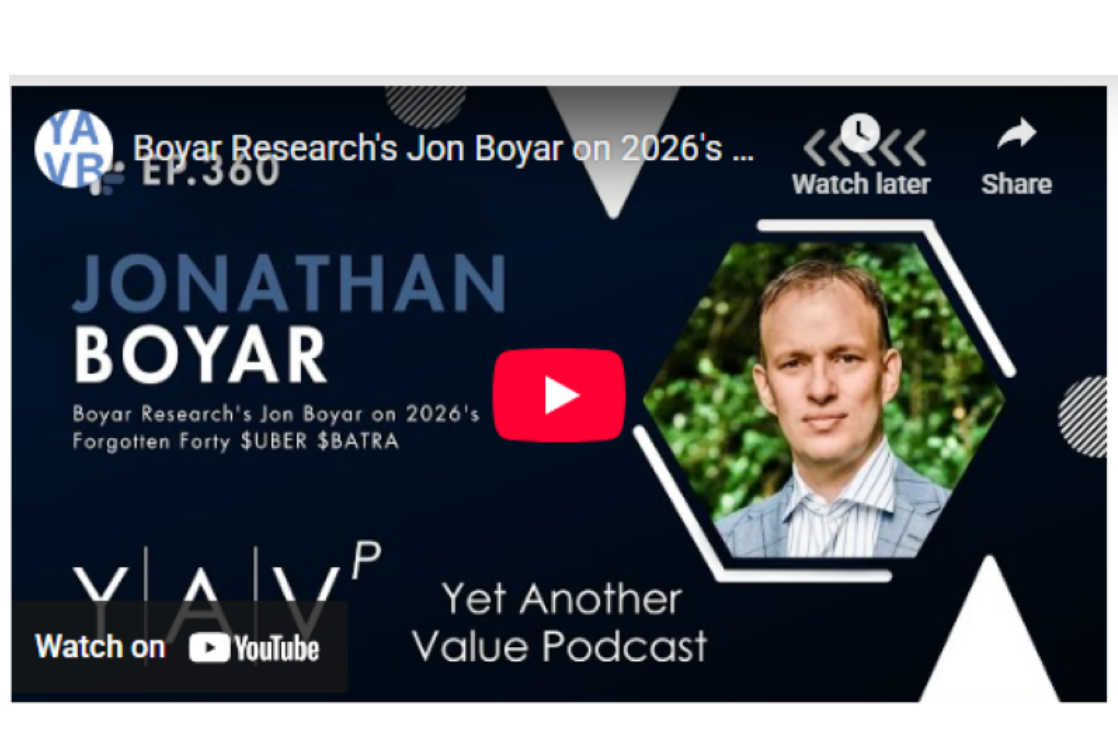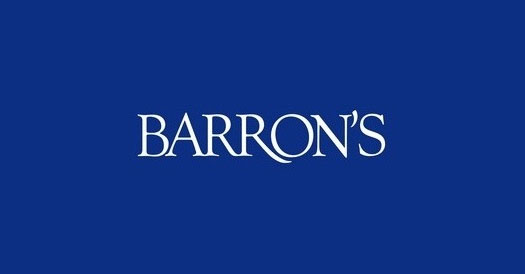Howard Lorber, CEO of Vector Group, Chairman of Douglas Elliman and Nathan's Famous, on the New York real estate business and how he believes technology will impact the real estate brokerage business.
Mario Gabelli, Chairman & CEO of GAMCO Investors, Inc., on portfolio construction and who he believes could be the next John Malone. - Boyar Value Group
Ryan Serhant CEO and Founder of Serhant, on the NYC real estate market, potential technological disruption in the real estate brokerage industry, his firm Serhant, Jolie at 77 Greenwich and more. - Value Investing Podcast
Steve Einhorn, Vice Chairman of Omega Advisors, Inc., on investing in an unpredictable political environment and how Omega blends microeconomics with fundamental investing. - Value Investing Podcast
The interview discusses:
-
- How he helped turn Nathan’s Famous from a small restaurant chain into a global licensing business that sells over 480 million hot dogs per year;
- Characteristics he looks for in companies he looks to acquire;
- His thoughts on the New York real estate market;
- What areas within the New York residential real estate market he believes currently offer the greatest values;
- His views on technology disrupting the real estate business and who is potentially most vulnerable;
- How he believes tobacco companies will participate in the cannabis market.
About Howard Lorber:
Howard Lorber is the president and CEO of Vector Group Ltd., a holding company. He is also the Chairman of Douglas Elliman, a subsidiary of Vector, which is the largest residential real estate brokerage in New York metropolitan area with 4,000 brokers as of 2014 (and an additional 300 in Florida). Lorber is chairman of fast food chain Nathan’s Famous .
Click Below to Read the Interview Transcript
Transcript Of The Interview With Howard Lorber:
Jonathan Boyar: (00:11):
Welcome to the World According to Boyar, where we bring top investors, bestselling authors, and market news makers to show you the smartest ways to uncover value in the stock market. I’m your host, Jonathan Boyar. Today’s guest is Howard Lorber, CEO of the Vector Group and Executive Chairman of the Board of Nathan’s Famous. Howard welcome.
Howard Lorber (00:32):
Thank you. Nice to be with you.
Jonathan Boyar (00:34):
You’re probably best known for being Chairman of Douglas Elliman, a real estate brokerage house with almost 27 billion in sales. But long before that you helped engineer a takeover of Nathan’s Famous, the hot dog company. What opportunity did you see at the time?
Howard Lorber (00:49):
Well, Nathan’s is a similar to a few other deals I did had something in common. It had a great brand name in business for many years and not the best management. And I always felt that companies with great brand names almost always survive, no matter how bad the management is at times or how bad the markets are for whatever they do at times. They’re pretty hard to kill. So I saw Nathan’s is fitting that category that with a great management team and plans to grow, that there would be a real winner over a period of time. And having said that, it took longer to really get it going than I thought, which happens a lot. But on the other hand, when you look back now, it was the right deal to do because of the name and because of the expansion we were able to do. And then the shareholders did very well including myself.
Jonathan Boyar (01:42):
Was the plan always really to become… get into the licensing business or did you expect to open more stores? It’s a very interesting evolution.
Howard Lorber (01:53):
Yeah. Well look, we started off when we took a private and started doing some franchising, then we took it public again and we’re plan was to use some of that money to open new stores. And really what happened is we opened a couple of new stores and they really weren’t doing well and we weren’t going to just keep opening stores and go through all the money when we saw that it wasn’t working.
Howard Lorber (02:15):
And one of the issues in thinking about the company and thinking about hot dogs in general, I think most people view hot dogs as a snack, as a snack food, not as a meal. Okay. So how could you make money in a restaurant, especially a large restaurant when people view it as a snack food.
Howard Lorber (02:34):
Then we tried different things. We tried by using other brands in conjunction with Nathan’s in the bigger stores and so forth, but it’s still with the rent you had to pay and the help you needed, it still didn’t really work too well. So we started looking more into the licensing business and we were stuck at the time with a license that for supermarket sales, which was not a great license deal for us. At the time we did it, I think it was when we were first taking it private and we didn’t have much leverage on what we could negotiate for, but years later we were in a much better position than when the first license agreement expired, we were able to make a deal that was multiples better than the first deal we had.
Jonathan Boyar (03:18):
In 93, 94 you join Vector and since the 90s the stock has gone up after dividends, I believe, over 10,000%, which has basically outperformed almost every other publicly traded company, including Berkshire. Can you discuss the evolution of that company?
Howard Lorber (03:34):
Well, thank you for the compliments. Anytime anyone mentions it in the same vein as Berkshire, I’m happy and proud. Look, we believe when you look at the tobacco business there was lots of litigation risks, lots of things going on in those days. And we were well aware of that and we were able to do a couple of things to limit those risks and also to benefit from a settlement with plaintiffs, which at a certain point in time were the state’s suing the tobacco companies for not disclosing the risk of nicotine being addictive. So the days of the lawsuits of cigarette smoking causing cancer were sort of waning because the warnings were on the cigarettes for so many years already by that time, so some smart lawyers came up with the theory of suing under the theory that it was never warned that nicotine is addictive, and maybe if people knew what was addictive, they wouldn’t start.
Howard Lorber (04:25):
So in any event we found a way to settle and get a special deal, and when the industry settled, we had a deal which allowed us to go from a company tobacco company making very little, if anything, to making a substantial amount of money on an ongoing basis. And our belief was still was an industry with problems and with really no big growth, because tobacco has gone through a constant slow decline over the years. So we always felt that the best thing to do was to pay out whatever we could in dividends to the shareholders, and that was a benefit, and that’s why the numbers look so good in returns. So for I think almost 20 years, we paid a dividend and we paid a stock dividend also for maybe most of those same years, and actually that was the plan.
Jonathan Boyar (05:16):
You can’t argue with success, but dividends are obviously not very tax efficient. Why dividends over buybacks?
Howard Lorber (05:25):
We thought about buybacks, but honestly we really did believe that the dividends were really what the shareholders wanted, so we didn’t really concentrate completely on tax efficiency and I think that the dividends ultimately did good for the shareholders, did very well for the shareholders. I’m not so sure the stock buybacks would have been the same, because at certain point you start buying back stock and then the stock goes way up and you have to stop buying back stock. The dividends you can just be paying. If you have the money, you just keep paying. So we felt that dividends were a better strategy.
Jonathan Boyar (05:59):
As I said, you can’t argue with success. I mean, in terms of the tobacco business, do you see tobacco companies the way beverage companies are starting to enter the cannabis industry? Do you see tobacco doing the same thing or is it a completely different business?
Howard Lorber (06:15):
There are some similarities, so you can’t say it’s completely different. But I will say from our point of view, the big difference is the fact that cigarettes are federally licensed and tobacco is federally controlled. Cannabis isn’t. It’s state by state. So a lot of times we’ve had cannabis companies come to us say, “Oh, it’d be great if you could distribute our product.” And we have a big distribution network and selling our cigarettes. But the problem is you can’t. You can’t do it. It’s state by state. So it really doesn’t work for us. And I think the tobacco companies that are going to make money in cannabis are the ones that invested in other companies that are completely remote. There’s really no tie in. They’re not distributing the product with their cigarettes. So it’s just a matter of investment.
Jonathan Boyar (07:04):
Yeah. And it’s obviously very hard to invest when it’s illegal on a federal level. So it’s-
Howard Lorber (07:09):
Exactly. For a public company especially. Yeah, it’s not something that we’d want to be involved in.
Jonathan Boyar (07:14):
So the most well known part of Vector is Douglas Elliman, which you bought in your early 2000s. What attracted you to this business? Was it brands again?
Howard Lorber (07:25):
Same story. Okay, great brand name. In business since 1911. Went through about three sales of the company over a short period of time. Not great on the management side. And as I always say, that if the management is great, how much more can me or my team add to the value? So this was a case where I felt we could add a lot, much as the same way I felt about Nathan’s. And it’s worked out.
Howard Lorber (07:56):
Right now, tougher time in the real estate business. Real estate is cyclical. A lot of real estate companies, in general, have over long periods of time have done well, but I have gone through the ups and downs and it’s a cyclical business. And look, let’s face it, the companies that I’ve done the best stock wise are companies that have consistent earnings growth, okay? Not cyclical. And so if we look, especially at the commercial brokerage companies, boy, they’ve been up and down and up and down and up and down, wide swings. And now you’re seeing that in the residential, because we’ve all grown and now we go into a tougher market, especially in New York and it’s been tough on the stocks.
Jonathan Boyar (08:39):
There’s a lot of talk. I mean the media loves to beat a story to death about disruption in the brokerage business with technology. Are there areas or pockets of the real estate market perhaps in the low end that there might not be a need for a broker in the future? I’m not about Billionaire’s Row.
Howard Lorber (08:56):
The answer is maybe. I think in markets maybe in the middle of the country, the discounters could probably grab some market share much easier than they could do it in major metropolitan areas. I don’t see it happening in New York City or the suburbs around New York. I don’t see it happening in South Florida. I don’t see it happening in California. I don’t see it happening in Boston or Aspen. And these are all the places where we are. I think that is not going to happen in any of those places.
Howard Lorber (09:26):
But yes, there will be companies that come into the market completely different models, whether it’s technology or whether it’s the discounters or where there are companies now who are brokers who now get 100%. All they have to do is pay a monthly fee for their desk. So there’s lots of options that have been around for a while.
Howard Lorber (09:47):
I wouldn’t say the big markets are immune from it, but as much less likely that it will happen. And also on the technology side, the one thing that I’ve learned over the years is you hear something about technology and generally it does happen, but it never happens as fast as anyone thinks. It’s always years and years and years later.
Howard Lorber (10:10):
I had that experience myself once. In some business daily, I ended up with a small chain of video stores. I think it was six or seven video stores, stores like Blockbuster, but smaller. And one night I’m watching television and there’s a business report, and it talks about something new that’s coming out. And that was called pay per view, where you could sit home and use your television remote in order movies. And I said, “Wow.” I didn’t sleep too well at night. I said, “That’s going to be the end of the video store business. Who’s going to go to a video store? Why would you go if you could sit at home and get the videos?” So the next morning I called up someone I knew at Blockbuster and I sold the video stores pretty quickly. And guess what? It eventually did happen, but it was almost 20 years later. So technology doesn’t change markets that quickly.
Howard Lorber (10:59):
And you could look at, even at Amazon. Amazon, everyone thinks it is great, it’s fantastic. When did they start? In 1990 or early 90s. It just doesn’t happen overnight.
Jonathan Boyar (11:09):
Yeah, it’s usually a slow bleed. And as I said, newspapers love to tell us a story. I mean that’s how they sell papers.
Howard Lorber (11:16):
They want to say out a disruptor. There’s disruptors coming into the market, and that’s going to be the end of the market and it may happen someday, but it’s not going to happen fast.
Jonathan Boyar (11:24):
In the areas that you operate, the competition for good brokers is unbelievably intense. You have people like Fredrik Eklund who just have unbelievable production. How do you convince them to stay with you? It’s just seems like the brokers have a very big hand.
Howard Lorber (11:43):
Generally speaking, brokers that leave for other companies, the ones that are doing great don’t leave so quickly, because why disrupt what they’re doing? The ones that tend to leave are brokers in bad markets, that are not doing that well, that just want to change or they’re being offered something where they get a few dollars and they figure well I shouldn’t go because I’m not really making much money now. So I think that’s basically what happens. But also I have a relationship with many and most of, probably all of my really high end, good brokers, but I’ll see anyone. I have eight appointments, seven, eight appointment a day and they’re all pretty much with brokers. Everyone knows they can pick up the phone and call me. So even though we’re a very large company, I still operate it. We try to operate it entrepreneurial and that means that the people, our executive team and myself are always available, whether you’re a big producer or a small producer are always available to help guide you. If you need more money for advertising, come to us. If it makes sense, we’re going to do it.
Howard Lorber (12:49):
We try to treat the people… it’s just simple thinking. And what I learned early on in the business is the buyers and sellers of the real estate are not my customers. Those are the customers of my brokers. So who are my customers? My customers are our salespeople, our brokers, because I’m… so therefore my job is to help them make more money. If I can help them make more money, we make some money. So I think if you think about the business that way is a pretty simple business to operate.
Jonathan Boyar (13:22):
I hope you’ve been enjoying the interview with Howard Lorber. to be sure you never miss another World According to Boyar episode, please follow us on Twitter @Boyarvalue. Now back to the show.
Jonathan Boyar (13:40):
How helpful is shows like Million Dollar Listing, which prominently feature a lot of your brokers or some of your brokers and you’ve made a few cameos, been for the brand?
Howard Lorber (13:50):
I think there was suspicion about how it would work in the beginning, including myself. I wasn’t sure, because we used to say, “Reality TV, there’s no real in reality.” But there is. So I think that looking back it’s been a great experience for the brokers. Million Dollar Listing has done unbelievably great. It is one of the top shows. I forget, the viewership is something like 18, 20 million now.
Jonathan Boyar (14:19):
Yeah, it’s one of Bravo’s best shows.
Howard Lorber (14:20):
It’s Bravo’s best. And I can only tell you my son was on for one year, the first year. I was in London with him a few weeks ago on business. There were people coming up to him saying, a couple of people, not a lot, but I think two different people came up and said, “I remember you, you were on Million Dollar Listing. This is seven years ago. And so the show has had a big effect on the brokerage business. And the companies that were very much against it, now would be thrilled to have someone on the show. I don’t think there’s any company that honestly would say, “Oh, we don’t want our broker to be on the show.”
Jonathan Boyar (14:54):
You couldn’t pay for publicity like that. I mean it’s-
Howard Lorber (14:56):
Exactly, exactly.
Jonathan Boyar (14:58):
On those shows, especially in New York and LA, you see sales numbers $10, $20, $30 million and then it shows the potential commission. I guess they kind of multiply… put a 6% next to it or 3%. How real are those numbers at the real, ultra high end? Are those numbers negotiable on a case by case-
Howard Lorber (15:16):
Commissions are always negotiable at the end to get a deal done. So typically what happens is you try to list in New York between 5 and 6%. That’s basically where it’s at and probably the average is about 5.5%. And then generally there’s two brokers. So if you have a negotiation because the seller’s not getting the full price you wanted, what I always say is, “How do you get the deal done?” It’s pretty simple when you think about it. The seller’s going to have to take a little less, the buyer’s going to have to pay a little more and maybe the broker’s going to have to get a little bit less commission. That’s how you do business.
Jonathan Boyar (15:54):
I mean, you’re certainly the pulse of the New York City real estate market. The press keeps talking about how bad it is. Is it really so bad?
Howard Lorber (16:03):
No, no, it’s bad compared to… we’re a little spoiled, right? We had a bunch of great years after the recession of 08, 09. And I’d say probably 15 was the best and then it started coming down a little bit. And I guess it still remains to be seen how much ultimately the SALT, the loss of the SALT deductions come into play. I’m sure they’re going to come into play to some degree.
Howard Lorber (16:25):
And now also we have the start of the increase in a mansion tax, which goes into effect July 1st and so that’s going to be interesting. The first quarter was pretty close to the same as the first… little down from the first quarter of last year, but we’ll see. I mean the first quarter is not generally a good quarter in the business. The best quarters are the second and third quarter. I have a feeling the second quarter is going to be pretty good and I think there’ll be probably more deals, because I think there are people that are going to rush to get deals done before the increase in the mansion tax takes place.
Jonathan Boyar (16:56):
One of the stocks we own, which we think is substantially undervalued, is a really small company, Trinity Place Holdings. Their major asset is a property on 77 Greenwhich Street to come into market shortly. They have about 90 luxury residential condos between one and four bedrooms, and they’re talking about getting numbers between 23 and 2,700 per square foot. I might be off by a couple of dollars. In this market. Is that realistic or?
Howard Lorber (17:24):
Are they REIT? Are they a REIT?
Jonathan Boyar (17:25):
No, it’s not a REIT. It’s just Syms, the former Syms corpus.
Howard Lorber (17:30):
Yeah, yeah, yeah, yeah, sure, sure, sure. Look, I don’t know the product. I would say it doesn’t seem to be crazy, the pricing. Maybe close to the 23 than 27, but you have to know the product. Look, there’s two things people look at today. They look at price per square foot, but they also look at total unit price. So the question is in the design, how efficient other units, because what you want to do today is you want to downsize square footage wise and that gives you a chance to get a higher price per square foot. So you want to have smaller one bedroom, smaller two bedroom, smaller three bedrooms and then people start… because people shop by price per square foot. But equally, if not more important, is total unit price. There’s only so much that want to pay for one bedroom, so much they want to pay for a two bedroom, and so much they want to pay for a three bedroom.
Jonathan Boyar (18:20):
You were talking about being spoiled. I mean anyone who’s invested in New York real estate since the early 90s who held on for any reasonable length of time has had a very good return.
Howard Lorber (18:30):
That’s for sure.
Jonathan Boyar (18:31):
Could you ever envision a situation where there’s a protracted downturn like we had in the 70s or 80s where they actually are giving property away or is that just never going to happen?
Howard Lorber (18:43):
I don’t think that’s going to happen. I think that those days are far gone. You have a much more stable environment. Even in 08, look, people always call it the real estate crash. It wasn’t a real estate crash. It was the financial markets crash. Right. Just so happens real estate got affected by it, but it wasn’t really a real estate crash. The financial markets crash caused real estate to go down due to lack of liquidity and other reasons.
Howard Lorber (19:08):
But I don’t see that happening. In fact, you can make the case that real estate is really undervalued now again, because traditionally we looked at real estate and it’s followed directly with the market for stocks, for equities. And with the big run up the equities have had in the last two years, the real estate has come down in the last two years, in New York for sure. New York City for sure.
Howard Lorber (19:34):
So the question would be is it going to be a catch up? And it very may well be a catch up and I think maybe the loss of SALT deductions has tempered it a little bit, but I think there’s still a reasonable chance that the real estate market is going to start outperforming again to catch you up with what the stock market has done.
Jonathan Boyar (19:55):
Yeah, that’s something that’s always… I’m a stock guy, but it’s one of the things that’s always perplexed me. Right now you look at the setup. You have ultra low interest rates. The economy is booming, and real estate hasn’t done well outside of the major cities. If you look on long Island, what you get compared to what you get in Manhattan is unbelievable. What’s caused kind of a lid on the real estate market?
Howard Lorber (20:22):
Well if you look at Westchester, Nassau, Fairfield County, the real problem was some overbuilding, that’s more in Fairfield County, but also the fact that the real estate taxes were very high. And now with the loss of the SALT deduction, you can’t deduct them except for $10,000.
Howard Lorber (20:42):
But having said that, I think you picked up on an important point. I think the suburbs around this city have again become compelling for people and for families. So you might see people starting to move back out there. It used to be young people getting married, they stay in an apartment in the city, they have a kid, by the second kid they’d move out to Long Island. And that would be that. Then you went through, now this recent years, you went through a period where they didn’t want to leave the city. Look, certain people, if they’re both, husband and wife are both working, it’s hard for both of them to be commuting and leave the kids every day. So that is difficult.
Howard Lorber (21:24):
But when they were able to leave and go out to Long Island, you look at what they were able to get, and this is the point you bring up. And therefore I think it’s somewhat compelling, Long Island is somewhat compelling again. And even if you were… and Westchester and parts of Fairfield County. So even if you buy a house for $2 million, $2.5 million and you’re paying $50,000 in real estate taxes, if you’re at a place in Long Island or Westchester, what a good school district, as opposed to being in the city and paying to private schools. You know what? It looks very cheap to be on Long Island.
Jonathan Boyar (22:02):
Yeah. And now that… if they ever actually connect Penn Station and Grand Central, if that actually ever happens, that makes Long Island even more valuable.
Howard Lorber (22:11):
Without question. When I bought my first expensive house on Long Island, I remember the broker was an old timer and he comped it to New York City condo price. And I remember how looking at and saying, “Wow.” I think New York City average condo price was $700 and I think the house I was paying 304 and the condo was… it was nice. It was okay building, whatever. But the house was on an acre, 6,000 feet. The condo, you couldn’t find a 6,000 foot condo. It will be a lot more money and I was on the water. And I said, “Geez, this is great when you compared it to the city.” But then again, those are rougher days in this city, when the city wasn’t doing as well and now the city has been doing great. So I think that, but I do think that there will be a trend which will start raising prices in the suburbs, because it’s just out of whack and things that I just out of whack generally something happens and it becomes more normalized. It really is at the point where it doesn’t make sense at this point.
Jonathan Boyar (23:11):
One final topic I just wanted to talk about, one of the things that you recently or I guess about two years ago you were appointed Chairman of the Holocaust Museum by the President. How has that experience changed you?
Howard Lorber (23:23):
Well, it’s been phenomenal. I would say it’s definitely life changing. My interest in it stemmed from my mother’s parents, my grandparents, who we lived with in the Bronx until I was about eight years old. My grandparents were Greek Jews that lived in this area of Greece, Thessaloniki, where half the Jews in Greek… it was about 100,000 Jews in Greece, 50,000 lived in this area, Thessaloniki. My grandmother and grandfather left early. They left around 1912 or 1913. But I remember asking my grandmother when I was about, I guess about five or six years old. My grandfather had passed away and I said, “What happened to grandpa?” And she told me the story that although they were able to get out early when the Nazis went into Greece, in Thessaloniki, they took… 48,000 of them were basically murdered in Auschwitz-Birkenau, and that they lost every friend they knew, relatives and so forth. They were lucky enough to already been here in the United States.
Howard Lorber (24:25):
And I always had that constant thought in my mind, when you think about it to wipe out 90% of the population in a small area because of their religion. It was just sort of inconceivable. And that was sort of my motivating factor into wanting to become more involved, to make sure things like that never happened again and I couldn’t think of a better way than doing it than through the Holocaust Memorial Museum.
Jonathan Boyar (24:54):
Is there more of a sense of urgency now that the last generation of survivors are getting up in age to make sure the stories are getting told?
Howard Lorber (25:04):
Yeah, without question there are, but in addition to that, look what’s going on, I’d say in the world, but let’s look at the country, with the shootings and the murders in the synagogues. I mean the antisemitism is surely on the rise throughout the world. And as time goes on, people tend to forget and that is our job is to never let them forget what has happened in the past. And I think that, thank God there’s other organizations, there’s other people that are trying to do it. There’s a position in the government that’s called the Special Envoy to Combat Antisemitism Throughout the World. It’s sort of an ambassador type position, and someone I know was just appointed to it.
Howard Lorber (25:50):
But this is the thinking now. You really have to be out there and you really have to fight what’s going on and it’s a difficult fight, but we have to do everything possible to make sure people remember so it doesn’t happen again.
Jonathan Boyar (26:04):
Well, Howard, I really want to thank you for your time today. You’ve been unbelievably generous with it and thanks for being on the show.
Howard Lorber (26:11):
Thank you. It was my pleasure, Jon.
Jonathan Boyar (26:18):
I hope you enjoyed the show to be sure you never miss another World According to Boyar episode, please follow us on Twitter @Boyarvalue. Until next time.
Important Disclosures. The information herein is provided by Boyar’s Intrinsic Value Research LLC (“Boyar Research”) and: (a) is for general, informational purposes only; (b) is not tailored to the specific investment needs of any specific person or entity; and (c) should not be construed as investment advice. Boyar Research does not offer investment advisory services and is not an investment adviser registered with the U.S. Securities and Exchange Commission (“SEC”) or any other regulatory body. Any opinions expressed herein represent current opinions of Boyar Research only, and no representation is made with respect to the accuracy, completeness or timeliness of the information herein. Boyar Research assumes no obligation to update or revise such information. In addition, certain information herein has been provided by and/or is based on third party sources, and, although Boyar Research believes this information to be reliable, Boyar Research has not independently verified such information and is not responsible for third-party errors. You should not assume that any investment discussed herein will be profitable or that any investment decisions in the future will be profitable. Investing in securities involves risk, including the possible loss of principal. Important Information: Past performance does not guarantee future results.
Never miss another podcast click here to subscribe today!
Available wherever you download podcasts
About The Boyar Family Of Companies
Boyar Asset Management
We have been managing money since 1983 utilizing our proprietary in-house value-oriented equity strategies. We manage money for high net worth individuals and institutions via separately managed accounts. To find out how we can help you with your money management needs please click here
Boyar Research
Since 1975 we have been producing independent research on intrinsically undervalued companies across the market capitalization spectrum and in a wide variety of industries using a business person’s approach to stock market investing. To find out how we can help you with your research needs please click here
Mario Gabelli, Chairman & CEO of GAMCO Investors, Inc., on portfolio construction and who he believes could be the next John Malone. - Boyar Value Group
Ryan Serhant CEO and Founder of Serhant, on the NYC real estate market, potential technological disruption in the real estate brokerage industry, his firm Serhant, Jolie at 77 Greenwich and more. - Value Investing Podcast
Steve Einhorn, Vice Chairman of Omega Advisors, Inc., on investing in an unpredictable political environment and how Omega blends microeconomics with fundamental investing. - Value Investing Podcast












